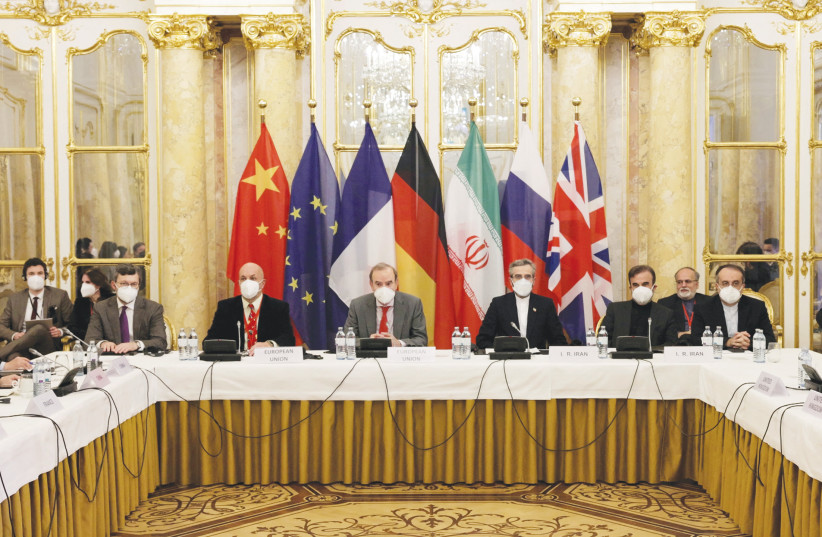US President Joe Biden should use his visit to the region this week to ensure that Iran knows there is a credible US military threat if it continues advancing its nuclear program, Likud MK Yuval Steinitz said on Sunday.
Steinitz, who as strategic affairs and intelligence minister coordinated Israel’s talks with the P5+1 (the five permanent UN Security Council members: China, France, Russia, the UK and the US, plus Germany) as they engaged in nuclear negotiations with Iran in 2013-2015, expressed concerns that Tehran advanced its nuclear program significantly farther than ever before in the past year because it no longer felt threatened by the US, and that Washington-backed air defense coordination between Israel and Gulf States is no replacement.
“The whole visit is only worthwhile if it gets one result: A US military threat to Iran,” Steinitz said. “That is what we have been missing in the past year, which allowed Iran, for the first time, to race to the bomb.”
Steinitz expressed concern about Biden’s opinion article in Saturday’s Washington Post, in which the president wrote: “My administration will continue to increase diplomatic and economic pressure until Iran is ready to return to compliance with the 2015 nuclear deal, as I remain prepared to do.” It mentions “diplomatic and economic pressure,” but not a military one, he pointed out.
Before Iran entered negotiations with world powers in 2013, it enriched uranium to 20% purity; while the agreement was in place in 2015-2018, it did not pass the 3.5% enrichment limit stipulated by the Joint Comprehensive Plan of Action.

After the US under former president Donald Trump left the deal, in 2018, Tehran violated the JCPOA, returning to 20% enrichment. Last year, it announced that it would enrich uranium to 60%, thought to be the closest any state without nuclear weapons has gotten to a bomb, which requires enrichment to 90% purity.
Iran has also increased the number of advanced centrifuges in use and, last month, disabled International Atomic Energy Agency monitoring cameras at nuclear sites.
“You need the US military threat in order to keep the Iranians at bay”
Yuval Steinitz
“The only new factor here is that for the first time in the last two and a half decades, they believe that the US military threat doesn’t exist anymore,” Steinitz argued, saying that the credibility of such a threat is an even more important factor than whether or not there is a nuclear agreement. “You need the US military threat in order to keep the Iranians at bay.”
Iran could get a nuclear bomb in as little as six months, he said, warning that “this is the last call for President Biden.”
The American-backed Middle East Air Defense alliance discussions involving Israel and Gulf States will be meaningless if Iran is allowed to get a nuclear weapon, Steinitz said.
“All the talk of bringing Israel and Saudi Arabia closer and that maybe our planes will be able to fly over their airspace on the way to India – that’s all very nice, but if Iran gets a nuclear weapon, it will overshadow all the steps of bringing countries closer together. This is the only real game in town now,” he stated.
What happens if Iran goes nuclear?
“If Iran gets the bomb, many will break up the alliance and align themselves with Iran,” he predicted. “Israel will be under an existential threat… Iran already has missiles that can deliver nuclear warheads to Europe… If Iran goes nuclear, other countries in the vicinity will follow immediately, like Saudi Arabia, Turkey and Egypt. It will be the end of the nonproliferation regime.”
The former strategic affairs and intelligence minister clarified that he is not questioning whether Biden supports Israel and its right to defend itself. He recounted meeting the president in the Senate in the early aughts, when he was Knesset Foreign Affairs and Defense chairman and the now-president was chairman of the Senate Foreign Affairs Committee. Biden greeting Steinitz by saying: “First thing I want to tell you is that I define myself as a devoted Zionist.”
He also said that this is not a partisan argument that only Republicans can keep Iran from getting the bomb. Steinitz argued that during the tenure of former US President Barack Obama – a democrat – Iran felt deterred enough to not pass 20% enrichment, pointing to American aircraft carriers in the Gulf and the surge in Afghanistan as possible reasons for that.
Even if Iran returns to the JCPOA, the US has to have a “big enough stick” for the Islamic Republic to comply with it, Steinitz said. “That was true under [former presidents] Bush, Obama and Trump, and it is true and crucial now.”
“This is the responsibility of the US and Biden,” Steinitz said. “Iran is on the 40th kilometer of the marathon; there are only 2 kilometers left. The only way to stop them now is to revive the Obama-Biden-era credible military threat.”
Steinitz announced last week that after 23 years in the Knesset, he would not be running in the election in November.
In addition to strategic affairs minister and Knesset Foreign Affairs and Defense chairman, Steinitz has been Israel’s finance minister – instituting the two-year budget and bringing Israel into the OECD – and energy minister, formulating the framework for gas exploration, taxation and exportation of natural gas in Israel’s economic waters.
Steinitz has a PhD in philosophy, and was a professor at the University of Haifa before entering politics; once a Peace Now activist, he became disillusioned by the terrorism that followed the Oslo Accords and joined the Likud.
